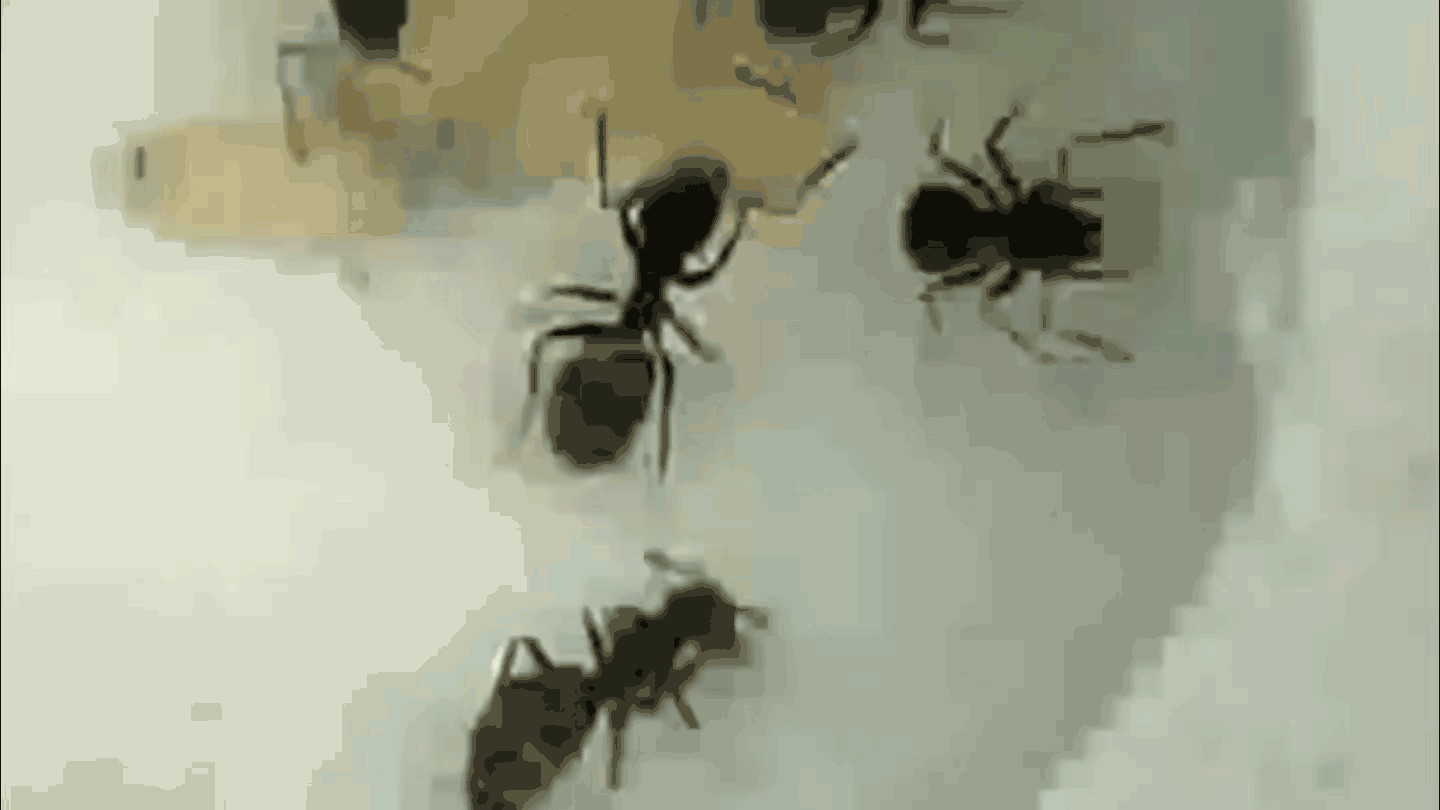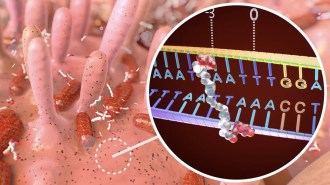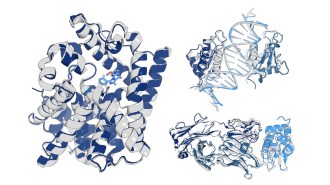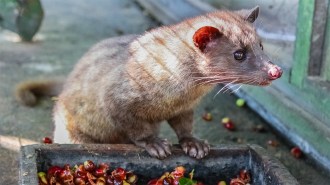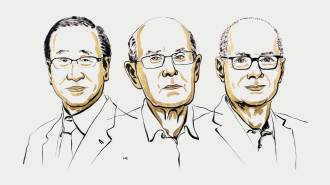Over the past 3.5 billion years, cells have evolved into superlatively sophisticated chemical factories capable of churning out thousands of the most complex and capable molecules known. Whether it’s translating DNA into proteins, responding to a viral attack, or transforming sugar into cellular fuel, many biochemical feats rely on a choreographed series of steps. The exquisite efficiency with which cells manage this chemical jig is capturing the imagination of scientists such as David Liu at Harvard University. “The way chemists synthesize molecules is very different from the way Mother Nature goes about it,” he says. “The question is, What is it about nature’s approach that is so efficient?”

More important, he adds, how can chemists use that knowledge to solve problems in the lab?
For his part, Liu is commandeering DNA’s self-assembling properties to improve the synthesis of chemicals that can be useful to industry. By tethering molecules to fragments of DNA, he coerces the genetic bits to bring together molecules that would never react if they merely were dissolved in the same solution.
“The idea of applying biological principles to solve chemistry problems is an area that is really growing very quickly,” says Liu.
Mimicking nature’s chemical strategies can also lead to products and manufacturing processes that use fewer hazardous materials than current methods do. What’s more, such green chemistry is good business. By adopting green-chemistry practices, companies can reduce their waste-disposal costs while increasing the efficiency of their processes, according to Paul Anastas, director of the American Chemical Society’s Green Chemistry Institute in Washington, D.C. “Biomimicry is one extremely powerful tool,” he says.
Matchmaker
Traditionally, when researchers set out to make a chemical, they mix reactant A with reactant B at high concentrations in the hope that molecules of each will randomly collide to form the target product. To make multiple chemicals requires mixing each set of reactants—say, C plus D and E plus F—in a separate flask. If all the reactants were mixed in the same pot, A would be free to react not only with B, but also with C, D, E, and F. “You’d get an uncontrolled mixture of products,” says Liu.
By piggybacking molecules on short strands of DNA, Liu can use smaller amounts of reactants and control their chemical fates with precision. When two strands of DNA with complementary sequences of bases encounter one another, they naturally zip together. Liu reasoned that by first attaching a small molecule to each side of the zipper, the molecules would end up close enough to undergo a chemical reaction.
Using DNA strands with different sequences, each strand carrying a specific molecule, the researchers have performed multiple chemical reactions simultaneously without the products cross-reacting. Liu and his colleagues reported in the Sept. 30, 2004 Nature that they had used what they call their DNA-templated synthesis technique to run 168 chemical reactions simultaneously in the same vessel.
The Harvard team started off with two pools of DNA strands—12 different sequences in each pool. Each strand had been linked to a different organic molecule. Then, they combined the two pools.
After about 10 minutes, the researchers added magnetic beads designed to latch on to those strands whose molecules had undergone a chemical reaction. Finally, the researchers passed the solution over a DNA microchip to identify these strands—and therefore the corresponding chemical passengers.
When the results were in, Liu and his coworkers discovered that they had created a new chemical reaction. Combining a pair of representatives from two major classes of organic chemicals known as alkynes and alkenes yielded a trans-enone—a structural motif found in some medicinal compounds.
The researchers had not only found an alternative route for making enones but also discovered that they could repeat the reaction without DNA and using simpler organic starting materials than previous methods for making enones used.
Because researchers can prepare a multitude of unique DNA sequences, the new technique offers the potential to screen thousands of different reactants in a single drop of liquid and to find those pairs of reactants that can chemically react with each other, says Liu. That tiny reaction volume minimizes waste and the time it takes to investigate the many chemical interactions.
Says Liu: “It basically increases the efficiency of the discovery process to the point where it makes it practical to look for rare, unexpected reactions.”
It also enables researchers to perform multistep reactions in a single pot. “Normally, in a complex mixture of reactants, you wouldn’t be able to control whether step one takes place first or last,” says Liu. However, in separate work, he and his coworkers have programmed DNA fragments to bring together reactants in a specific order.
A natural fit
Many future breakthroughs in environmentally benign materials will come from studying how molecules in natural systems react with one another and form structures, says John Warner. A medicinal chemist by training, Warner worked as a research scientist at Polaroid for 10 years. There, he applied his knowledge of physiology to the company’s chemical-manufacturing processes. In the late 1990s, he left Polaroid to start the Center for Green Chemistry, now located at the University of Massachusetts in Lowell.
“When we design a material, instead of forcing materials to do things that they don’t want to do, we should find out what materials want to do and allow them to come together,” says Warner. For instance, one of his recent innovations was inspired by the mechanisms underlying the skin disease psoriasis.
In people with psoriasis, the skin cells replicate profusely, acting as if they’re wounded when they aren’t. One form of therapy exposes the skin to ultraviolet (UV) light. The treatment works because thymine, one of the building blocks of DNA, is photosensitive. When exposed to UV light, two thymines react to form a disruptive complex within cell’s DNA, thereby slowing the cell’s rate of reproduction and alleviating psoriasis.
Warner decided to take advantage of thymine’s light sensitivity by attaching that molecule to a water-soluble polymer. Shining light on the polymer caused the thymine groups to react and link the polymer chains. Warner says, “The thymines seek each other out and hold each other in place to make the photoreaction incredibly sensitive.”
Such cross-linking reactions are fundamental to the microelectronics industry, says Warner. Molecular links are required for making photoresists, light-responsive polymer films used to create the circuitry on chips.
“Most cross-linking agents are small molecules that are highly toxic and hazardous,” says Warner. Replacing these agents with a biological alternative such as thymine could lead to more environmentally friendly photoresist materials, he says, noting that synthetic polymers containing thymine are nontoxic.
A similar approach could lead to greener ways of making plastics. The bacterium Escherichia coli harbors an enzyme called DNA photolyase, which reverses the photoreaction between two thymines. Warner may use this enzyme to make reusable plastics.
“Imagine I have a plastic cup made out of my polymer,” he says. “Shine a little bit of UV light on it to make the crosslinks, and it becomes robust, stable, virtually indestructible.” Put the cup in a vat with DNA photolyase, however, and it reverts to its original polymer. “You collect that polymer and tomorrow you make a new cup,” says Warner.
Reducing the energy required for making solar cells is another goal of his group. The production of today’s silicon-based solar cells requires first melting silicon at 1,000° C to make thin sheets of the material. Such a solar cell would need to operate between 3 to 15 years to generate enough electricity to recapture the energy that went into making the device, says Warner.
As an alternative to silicon, some researchers have turned to titanium dioxide, though the material still requires heating at 500°C. When Warner took a close look at films of titanium dioxide, he saw that their internal microstructures resemble those of seashells. To Warner, this suggested that it might be possible to emulate natural shell-making processes to create titanium dioxide films.
To make their shells, mollusks rely on small organic molecules that chaperone particles of carbonates to assemble elaborate mineral structures at ambient temperatures. So, Warner enlisted small organic molecules with multiple carboxylic acids that bind to titanium dioxide particles and grew films of the solar material at room temperature.
Although the efficiency of solar cells made with films produced this way is only a fraction of that of conventional cells, Warner is not concerned. By his reasoning, a solar cell that’s a tenth as efficient as a silicon-based device, yet a ten-thousandth as expensive, could have a huge impact.
Clever capsules
Numerous chemical processes could benefit from the sort of biomimicry that Warner is exploring. Take the pharmaceutical industry. For every kilogram of pharmaceuticals produced, between 25 and 100 kg of waste are generated, according to the drug giant Pfizer. Although drug companies recycle much of that waste, the process requires a lot of energy. The solution, says Cornell University’s Tyler McQuade, is to generate far less waste to begin with.
While pondering the way in which cells build complex molecules from simple building blocks, McQuade considered cells that make fatty acids from simple molecules. The cells recruit multiple enzymes that work in series. Material gets passed from one enzyme to the next, each charged with assembling one part of the fatty complex. “I thought, ‘Why can’t we do that?'” says McQuade.
He then developed a system of porous polymer capsules that mimic the enzymatic assembly lines that cells deploy. His first goal is to use the system to make the antidepressant fluoxetine (Prozac). Normally, that synthesis requires five chemical steps. After each step, the drug manufacturer isolates and purifies the interim product before adding it to the next solution. “One of those steps requires a particularly nasty reagent,” says McQuade.
With his microcapsules, he is working to combine four of these steps into one, while eliminating the need for the hazardous reagent, cyanogen bromide.
Each capsule, which can range in diameter from a few hundred nanometers to several microns, contains a catalyst that facilitates a particular step of the reaction. Some of the catalysts are enzymes, such as beta-galactosidase, while others are reactive metals, such as palladium and cobalt.
Because each capsule is porous, molecules enter and react with the catalysts. The modified molecules then exit and soon meet up with another capsule.
By carefully designing the capsules, the researchers can control the order in which the different reactions take place. One tactic they can use is to reduce a capsule’s pore size to limit entry to small molecules. Another tactic is to render each capsule’s interior either water repelling or water attracting, to draw in molecules with specific chemical properties. Since each product in the reaction chain will have a unique set of chemical and physical properties, the products will be attracted only to certain capsules.
So far, the researchers have developed a variety of polymer capsules. Some are made of nylon, a polyamide; others of polyaramide, the polymer used to make Kevlar. The next step, McQuade says, will be to start using the capsules in the synthesis of fluoxetine.
Anastas says that an increasing number of academic scientists and chemical companies are making important advances in green chemistry. “There have been tremendous accomplishments so far,” he says.
However, these advances represent only a tiny fraction of what’s possible. “For every process that’s been improved and made profitable through green chemistry, there may be 100 processes that have never been thought of in these terms,” says Anastas. “The future potential is just huge.”

